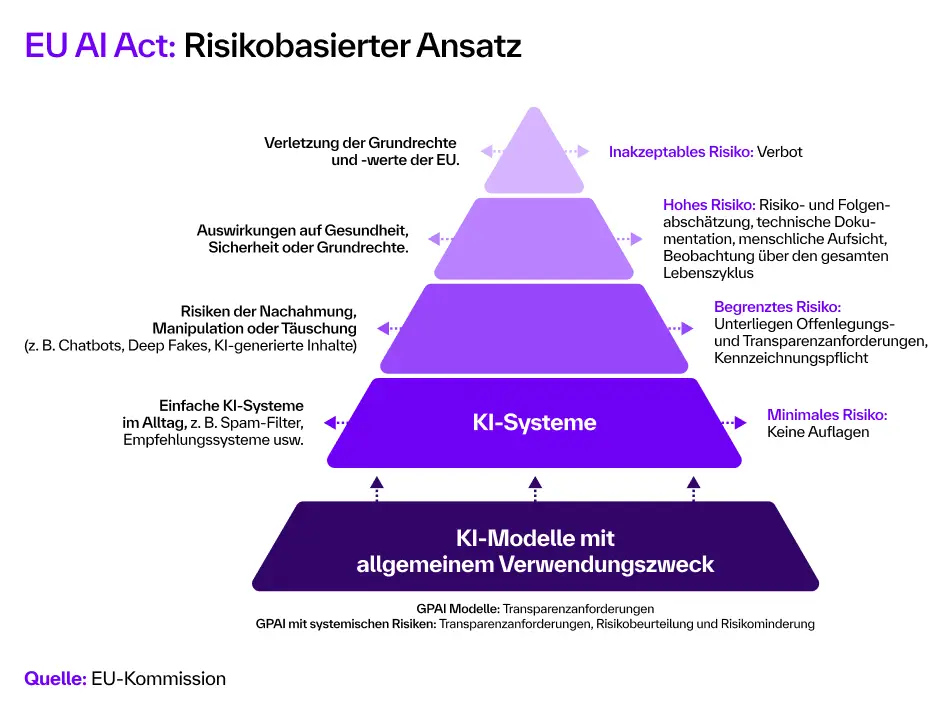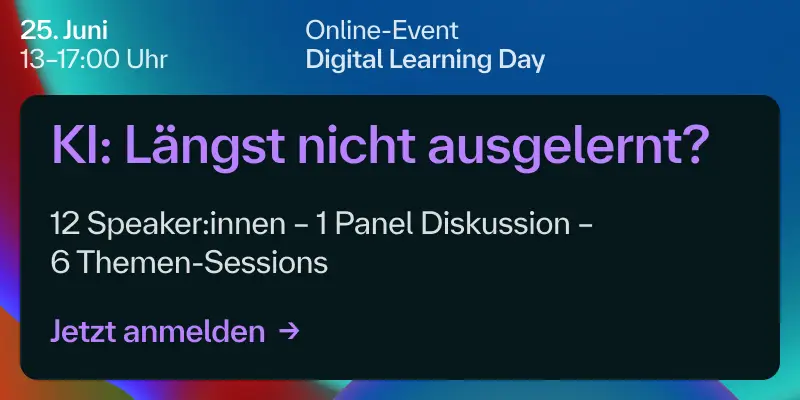Artificial intelligence (AI) is transforming the economy at an impressive pace: automated processes and data-based decisions are already shaping the everyday lives of many companies - and the technology's potential is far from exhausted.
The confrontation with Privacy notice , transparency, and ethical issues is a logical consequence. Against this backdrop, the European Union has developed the AI Act – the world's first comprehensive legal framework for the use of AI. Companies must act now, as binding requirements will apply as early as February 2, 2025.
What obligations will companies face? And what opportunities arise from the new rules? This article summarizes what you need to know about the AI Act.
Contents
- The EU AI Act at a glance: What's behind it?
- What are the consequences of the AI Act?
- AI skills: more than just a duty - benefits for companies
- The Haufe Akademie : Your partner for AI skills
- Conclusion: Shape the future of your company with the right skills
The EU AI Act at a glance: What's behind it?
The AI Act is a comprehensive AI regulation (also known as the AI Act, or AI Regulation for short) for the use of artificial intelligence in the EU. It is a central component of the EU's digital strategy. The aim is to make AI systems safe, transparent and ethical. To this end, the EU AI Act creates clear guidelines to minimize risks and promote innovation.
What is the EU AI Act?
The AI Act regulates the development, marketing and use of AI systems. The regulation assesses and regulates AI applications according to risk. The AI Act also distinguishes between AI models (e.g. large language models such as GPT) and the AI systems based on them (e.g. ChatGPT or Microsoft Copilot).
Definition of AI system according to the AI Act
An AI system is "a machine-based system that is designed to operate with varying degrees of autonomy and, once deployed, demonstrates adaptability and, for explicit or implicit goals, derives from the inputs it receives how it can generate outputs such as predictions, content, recommendations or decisions that can affect physical or virtual environments (...)" Art. 3 AI Regulation
Risk categories and prohibitions
The AI Act divides AI systems into four risk levels. The higher the risk of an AI system, the more comprehensive and stringent the legal requirements. The risk categories are:

- Minimal risk: no special requirements, e.g. spam filters or translation tools
- Limited risk: transparency obligations, e.g. for chatbots or AI-generated content
- High risk: strict requirements for high-risk applications, including risk management, CE marking and reporting of safety incidents, for applications in personnel recruitment or medical diagnostics
- Unacceptable risk: Ban on AI that violates human rights, e.g. social scoring (the classification and evaluation of people based on their social behavior or status) or manipulative technologies (systems that specifically exploit weaknesses or emotions to influence decisions)
Special case GPAI
In addition, the EU AI Act addresses general purpose AI (GPAI) models. These include large language models such as GPT from OpenAI. These models offer a wide range of applications and support user in various tasks - from the creation of texts to program code. The legal obligations for GPAI depend on the respective application and its risk potential.
When does the AI Regulation come into force?
Following the official entry into force of the AI Regulation on August 1, 2024, the EU is now gradually introducing the specific requirements.
All deadlines at a glance:
February 2, 2025: The first bans on certain AI systems come into force. Applications that violate fundamental rights or enable manipulation are affected. These include social scoring, AI-based emotional manipulation and real-time biometric monitoring in public spaces. These systems may neither be developed nor used.
August 2, 2025: New GPAI models (developed or commissioned after August 1, 2024) must meet all regulatory requirements.
August 2, 2026: High-risk AI systems must be fully compliant.
August 2, 2027: GPAI models commissioned before August 1, 2024 must be fully compliant.
Overview of other important deadlines: https://artificialintelligenceact.eu/de/implementation-timeline/
Why was the EU AI Act introduced?
With the AI Act, the EU wants to create trust in AI and minimize risks. The most important goals at a glance:
- Protect fundamental rights: The AI Act aims to ensure that AI technologies do not promote discrimination or violate fundamental rights. The focus is on fairness, transparency and ethical standards in order to prevent abuse and strengthen public trust.
- Promoting innovation: Uniform and clear rules provide companies with the necessary legal certainty for investments. This creates stable framework conditions that support the development and use of innovative AI technologies.
- Expanding technological leadership: With the AI Act, the EU wants to set global standards for the responsible use of AI. This strengthens the competitiveness of European companies and promotes sustainable innovation.

Free whitepaper
Understanding the AI Act
Get answers to the following questions in the white paper: When does the AI Act apply? What obligations does the AI Act entail? What are the penalties for non-compliance?
Download
What are the consequences of the AI Act?
The EU AI Act sets out specific requirements for companies that use or develop AI. The most important points:
Who does the EU AI Act apply to?
The AI Act affects all companies involved in the development, distribution or use of AI systems. This includes:
- Providers that develop and provide AI models or AI systems,
- Operators who use these systems in their own operations and
- Retailers who bring AI products onto the market.
Companies from third countries must also comply with the legal requirements if their AI systems are used in the EU.
Concrete measures for companies
To implement the requirements of the AI Act, companies should prioritize the following steps:
- Identification and documentation of AI systems: Which AI systems do employees use in the company? How and where are these systems used?
- Risk assessment: Which systems have which risk potential according to the categories of the AI Act? It is particularly important to identify high-risk applications. This assessment is essential in order to determine the next steps.
- Implementation of compliance measures: In this step, companies must develop a comprehensive risk management system, including technical documentation and regular security checks. Implementation depends on the specific risk potential.
- Incident reporting: Companies must establish processes to report security incidents to the relevant authorities in a timely manner.
- AI skills: AI providers and operators must ensure that their employees are well trained in the use of artificial intelligence.
Monitoring and possible penalties
National authorities monitor compliance with the regulations. Violations of the AI Act can result in high fines: companies have to pay up to 35 million euros or 7 percent of their global annual turnover - whichever is higher.
AI skills: training for companies
In addition to documentation, Article 4 of the EU AI Act requires affected companies to ensure that their employees have sufficient knowledge of AI.
These AI skills must go beyond technical knowledge. Especially when dealing with high-risk systems, employees must be able to assess the opportunities and risks of artificial intelligence and handle this technology responsibly. This includes training courses and clear guidelines that are part of the work processes.
Companies must make their teams fit for AI. According to Article 4, employees should ...
- understand how AI systems work,
- informed about the risks and
- be sensitized to ethical and legal aspects.
AI skills: more than just a duty - benefits for companies
The EU AI Act requires companies to ensure their teams have sufficient AI skills. The good news is that the resulting AI skills are more than just a chore - they open up real opportunities for companies.
Why are AI skills so important?
Artificial intelligence is changing the world of work. Companies that invest in AI skills benefit from the following advantages:
- Increased efficiency: Automated processes save time and costs.
- Competitive advantages: Technological know-how ensures innovative strength.
- Future-proofing: employees who understand AI are driving change.
- Personal development: Training courses promote specialist knowledge and professional growth.
According to a Statista analysis, the number of job advertisements relating to generative AI in Germany rose rapidly in 2023 - from less than 100 in January to 658 in December. Skills in text and image generation are particularly in demand. This underlines the growing need for professionals with specialized AI expertise to future-proof companies.
The Haufe Akademie : Your partner for AI skills
The Haufe Akademie is your reliable partner when it comes to meeting key requirements of the AI Regulation while simultaneously leveraging the opportunities offered by AI technologies. As a leading provider of corporate learning, we offer customized training and programs to help you future-proof your company.
Our approach is practice-oriented and flexible. We combine specialist knowledge with concrete application examples so that you can integrate the content directly into your day-to-day work. Whether basic knowledge, specialized training or individual solutions - we accompany you every step of the way.
Our offer at a glance:
- Individual training programs: Tailor-made content covers different needs - from basic knowledge to expert courses.
- Practical content: Our training courses are geared towards real-life challenges and help you to implement AI strategies effectively.
- Flexible learning: Whether online training, face-to-face events or hybrid formats - our solutions fit your schedule.
- Many years of expertise: Thanks to our experience in corporate learning, we know what companies need to stay ahead of the competition.
With the Haufe Akademie Invest not only in compliance with legal requirements, but also in sustainable development and competitiveness. Our training courses help you use artificial intelligence responsibly, identify opportunities, and lead your company successfully into the future.
AI further training
Targeted expansion of AI skills
Bring your knowledge up to date: discover our comprehensive range of training courses on artificial intelligence. Learn how you and your team can use AI technologies responsibly and meet the requirements of the EU AI Act.
Building AI skills
Conclusion: Shape the future of your company with the right skills
The EU AI Act provides companies in Europe with the ideal framework for the successful and future-oriented use of AI technologies. By building up AI expertise within the team, companies can take advantage of the many opportunities offered by the technology - from increasing efficiency in existing processes to greater innovative strength.
With practical training and comprehensive expertise, the Haufe Akademie on this path. Rely on future-proof training and schedule your consultation now!
Disclaimer
This text does not constitute legal advice and is not a substitute for individual legal advice. All information is provided without guarantee and is for general information purposes only.





